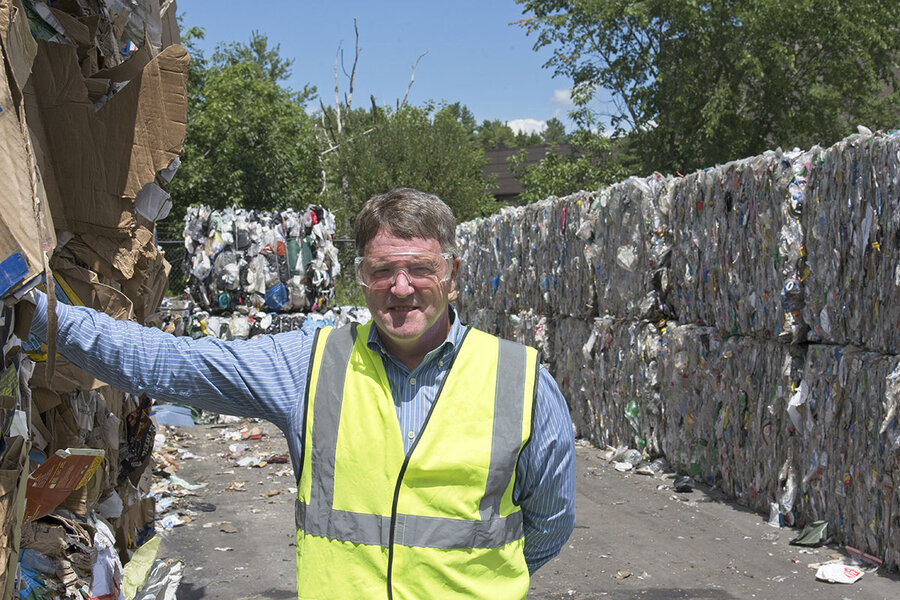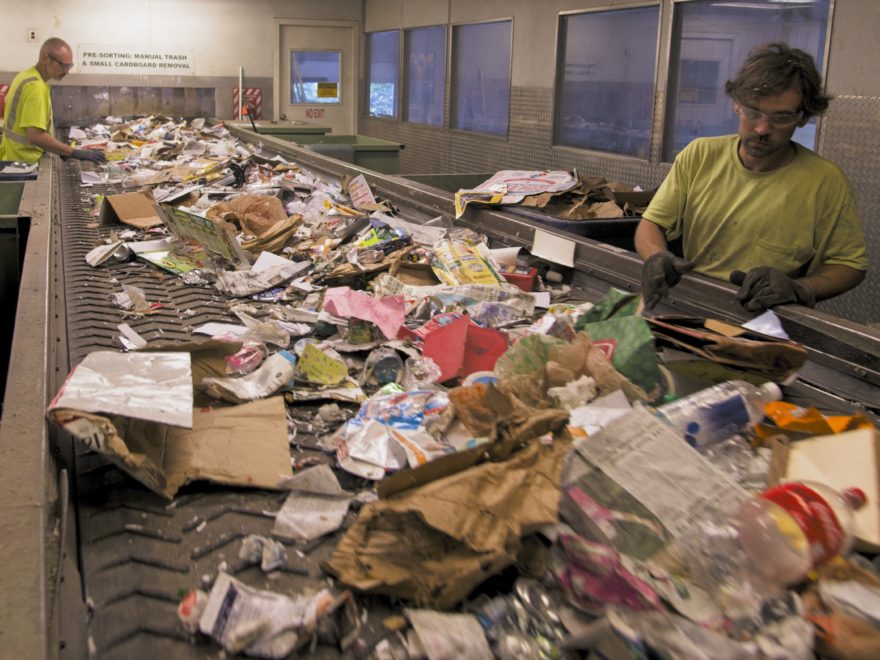read full story below or here: https://www.csmonitor.com/Environment/2020/0728/Is-recycling-broken-Don-t-toss-it-out-yet-say-insiders
July 28. 2020
- By Doug Struck Correspondent
PORTLAND, MAINE
Up the hill from Kevin Roche’s office, trash trucks clank and grind into a gaping warehouse, disgorging to conveyor belts the flotsam of modern households: bottles drunk, papers crumpled, plastic wrappers tossed, laundry cartons drained.
It is evidence, says Mr. Roche, the chief executive officer of Ecomaine, the state’s largest recycling facility, that neither a pandemic nor a ban by China has stopped recycling.
“The stories that recycling is dead are so far from the truth,” he says. “Even at the market conditions that we have today, material still is moving. It didn’t move at the prices that we’d like to see. But it still moved.”
When the coronavirus pandemic brought some recycling collections to a halt, most of them temporarily, it struck a blow against an industry still reeling from China’s 2018 decision to stop taking America’s paper and plastic refuse.
These setbacks cued a chorus of declarations that recycling is broken. “When people realize that the blue recycling bin is largely a lie,” Sen. Tom Udall, a New Mexico Democrat and a champion of recycling, told a Senate committee in June, “they are angry.”
But those in the recycling industry mostly shrug that off as hyperbole. Recycling is, they say, a wild business filled with jarring price swings, and those who survive – and the industry itself – must hang on for the long ride.
“Every time there’s a crisis in this industry, we recover,” says Mr. Roche. “The market always has its ups and downs.”
The long haul
Take his prices, for example. Mixed paper – the bulk of what is put out in curbside bins – is selling at minus $25 a ton with transportation, meaning Mr. Roche has to pay a paper plant to haul it away. A lousy arrangement? Yes, he says. But at one point it was selling for minus $70.
The last bale of milk jugs he sold earned $850 a ton – “a pretty good market,” he says with a grin. A bale of plastic soda bottles still fetches $115 a ton. And cardboard, suddenly in demand because of the surge in online shopping, is selling for $75 a ton.
“These are commodities, raw materials. The value fluctuates,” says Chaz Miller, a former Environmental Protection Agency employee who has spent 40 years in the scrap industry.
“Recycling is a business that you are not going to make a profit on every year,” he says by phone. “But if you do a good job and produce a quality product you are going to make a profit more often than not.”

Ecomaine, owned by 20 municipalities in Maine and contracted to take trash from another 50 – altogether more than a third of the rubbish collected in the state – is not trying to make a profit.
Twice as much trash ends up in the plant’s adjoining incinerator, where it is burned to make electricity, and some ends up buried in the landfill that Ecomaine also owns. Both landfilling and incinerating are, in the short term, cheaper than recycling, Mr. Roche says. His plant charges municipalities $75 a ton to bring trash to his waste-to-energy incinerator or when it is diverted to the landfill, and $95 a ton to bring materials into his recycling plant.
But he argues that simple comparison “is causing bad decisions,” and ignores the cost of maintaining a landfill in future generations.
Some municipalities say they can’t afford such long-term calculations. “We quit when it got cheaper to burn it than recycle,” says Mike Amero, foreman of the waste plant in Franklin, New Hampshire, which ended its curbside recycling program in 2018.
They were not alone. Several municipalities stopped recycling, at least temporarily.
High demand
Then, in March, the pandemic appeared.
“It was totally impossible to do recycling,” says Randy Cookson, director of solid waste and recycling in Gray, Maine, population 8,000. He stopped accepting recyclables at the town facility for three weeks to protect his small staff. Townsfolk stashed their materials in garages and basements, and when they reopened, the drop-offs were “overwhelming.”
In fact, recycling is such a household routine that most municipalities either continued recycling or quickly resumed when they figured out how to keep workers safe, and when initial fears subsided about the virus remaining on items placed in bins.
Waste Dive, a news site that covers the trash industry, compiled a list of about 150 municipal operations that temporarily suspended and another 90 that had stopped recycling in the past two years, out of roughly 10,000 curbside recycling programs nationwide. Some have resumed.
That’s not all prompted by civic motivation, notes Cole Rosengren, senior editor at Waste Dive. Recycled materials are a valuable, and growing, part of many manufacturing processes – between one-third to one-half of new paper in the United States is recycled feedstock, for example.
“The majority of this is stuff that manufacturers need and want and claim to want even more of,” Mr. Rosengren says.
In fact, following China’s 2018 ban, 23 new or expanded U.S. mills for paper and cardboard, and dozens of plastic plants, are opening to buy domestic recyclables, according to a study by Mr. Miller and others for the Northeast Recycling Council. Perhaps ironically, four of those plants are owned by a Chinese company that sends pulp to China.
Increasingly, recyclers are cutting costs through automation: Robot arms pluck items from conveyor belts, optical sensors direct a puff of air to separate certain plastics, automated intelligence is making smarter machines.
Recyclers also say homeowners should learn what to recycle and how to make it cleaner. They can be motivated. Hollywood, Florida, is putting scan-tags on recycling bins; the trash truck automatically credits the homeowner with 25 “Waste Pro Rewards” points for every full bin, which they can use for discounts at restaurants, oil change shops, and other businesses.
“They love it. They’re so enthusiastic. I get calls daily,” says Stacy Morin, recycling coordinator of the town.
Adds Randy Stovall, environmental services managerof Hollywood, “At the end of the day, everybody wins.”
Recyclers say the volatility of prices can be tamed by laws setting a minimum percentage of recycled material that must go into new products, or perhaps by added fees on landfilling.
Bottom of Form
“The American public loves recycling. That has not changed in 45 years,” says Mr. Miller. “We have to continue to struggle to get people to do it right.”
